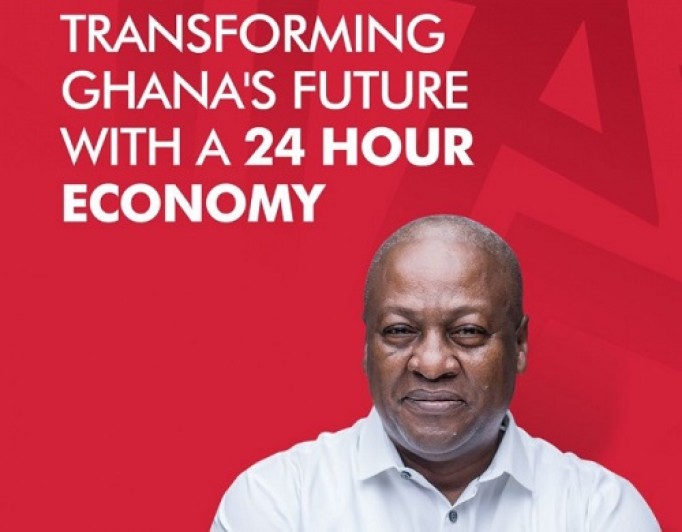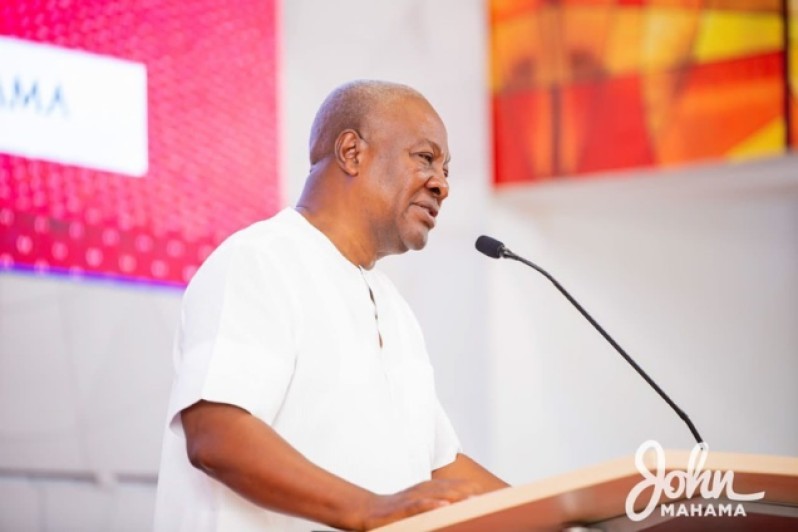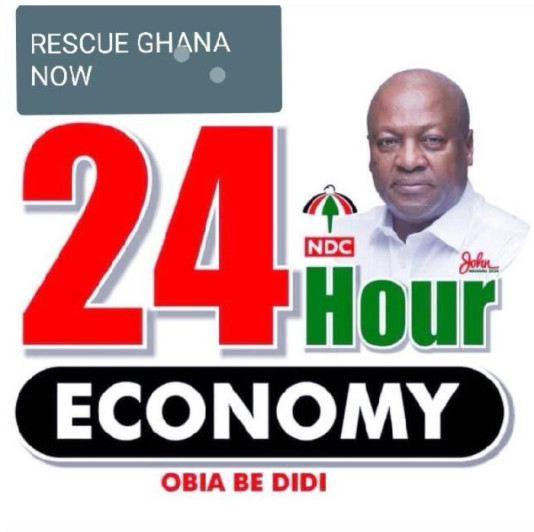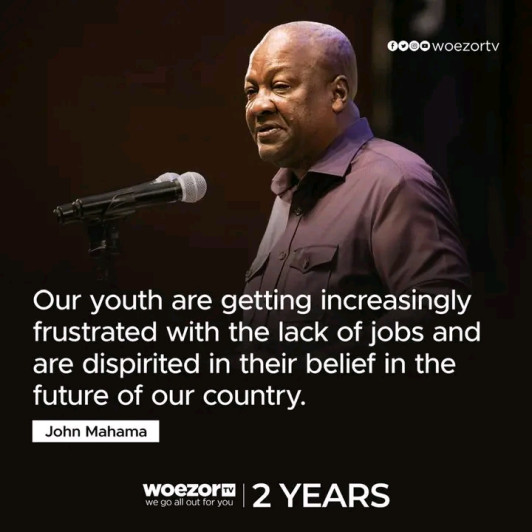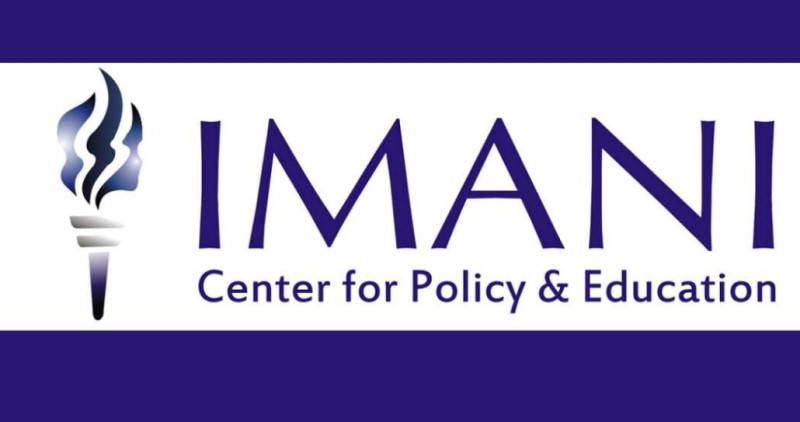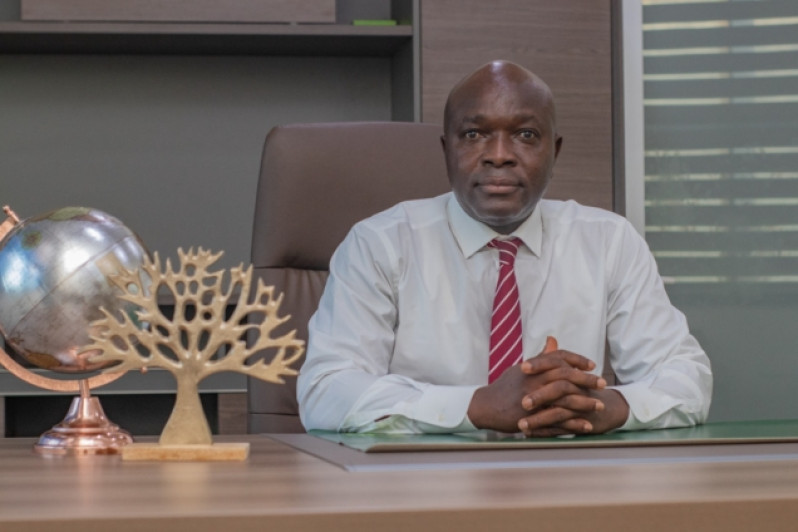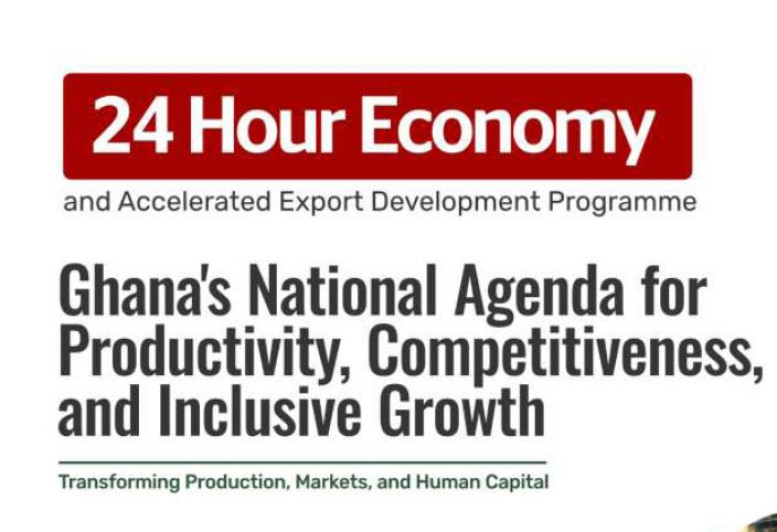
Ghana’s 24-Hour Economy: A Vision for Progress
In the tapestry of Ghana’s future, a bold promise by former President John Mahama emerges as a beacon of transformation — the establishment of a 24-hour economy. This groundbreaking proposal transcends conventional notions of governance, aiming to redefine our relationship with time and reshape the very fabric of our daily lives.
The 24-hour economy initiative signifies more than an adjustment in operational hours; it’s a paradigm shift that challenges the status quo. Advocates passionately argue that this transformation will be the catalyst for heightened productivity, fostering a more responsive, and accessible government.
At its core, this visionary proposition seeks to unleash a realm of accessibility previously confined by the constraints of time. Envision a nation where crucial services such as healthcare, public safety, and administrative functions are not bound by the ticking hands of the clock. It’s a captivating vision that paints a picture of a society where citizens can access essential services seamlessly, irrespective of the hour.
The 24-hour economy promises to dismantle the barriers of time, ushering in an era of unprecedented convenience for citizens. Imagine a healthcare system that responds promptly to emergencies during the darkest hours, a public safety infrastructure that remains vigilant, and administrative functions that cater to the diverse schedules of a dynamic populace.
This vision is more than an adjustment to business hours; it’s a catalyst for progress. It anticipates a future where the boundaries between day and night blur, opening avenues for increased economic activity, improved public services, and enhanced citizen engagement.
In the pages that follow, we will delve deeper into the potential benefits, challenges, and societal impact of Ghana’s journey towards a 24-hour economy. As we navigate this visionary landscape, one question lingers — can Ghana redefine time to redefine its destiny?
The Pros: A Glimpse into a Productive Future
Increased Productivity
The foundation of a 24-hour economy is rooted in the ambitious promise of heightened productivity, a key driver for economic growth and sustainability. By extending operational hours in government sectors, this innovative model seeks to eliminate the traditional constraints of time, fostering an environment where service delivery is not bound by the ticking clock.
In the paradigm of a 24-hour economy, the notion of downtime becomes obsolete. Government agencies, traditionally confined to specific working hours, will transition into a state of perpetual operation. This continuous workflow ensures that essential services are available without interruption, contributing to a seamless and more efficient service delivery mechanism.
The allure of a 24-hour economy extends beyond the mere extension of operational hours. It anticipates a dynamic environment where decision-making processes are accelerated. With real-time responsiveness, government agencies can swiftly address emerging challenges, make informed policy decisions, and adapt to changing circumstances without the delays associated with traditional working hours.
The implications of increased productivity extend to the broader economic landscape. A more efficient government apparatus catalyzes economic growth by creating an environment conducive to business operations. As government sectors operate seamlessly, businesses can function optimally, contributing to a thriving economic ecosystem.
Job Creation
In the pursuit of Ghana’s transition to a 24-hour economy, one of the most promising aspects lies in its potential to significantly impact job creation, particularly for the youth. The around-the-clock operation model not only breaks the conventional barriers of working hours but also opens a gateway to a surge in employment opportunities. This paradigm shift could be a transformative game-changer, directly addressing the persistent issue of unemployment that has long plagued our nation.
The innovative move towards continuous operation in various sectors, from healthcare to public safety and administrative functions, necessitates a larger workforce. This demand for a more extensive workforce presents a unique and timely opportunity for the youth to actively participate in the nation’s economic development. By joining the workforce, young individuals can not only secure employment but also contribute to the growth and vibrancy of the economy.
Youth unemployment has been a persistent challenge with far-reaching social and economic consequences. The 24-hour economy proposal emerges as a strategic response to this issue, presenting a tangible solution that aligns with the aspirations and energy of the younger generation. As more individuals gain employment opportunities, their purchasing power increases, leading to greater consumer spending and economic stimulation.
The shift towards continuous operation is not just a change in operational hours; it’s a societal transformation that has the potential to reshape the trajectory of our nation. By addressing the specific needs and challenges faced by the youth in the job market, the 24-hour economy becomes a catalyst for inclusive growth, providing a pathway for the younger generation to actively contribute to and benefit from Ghana’s economic progress.
In essence, the around-the-clock operation isn’t merely a policy shift; it’s a strategic move towards a brighter future where the youth are not just beneficiaries but active contributors to the nation’s prosperity.
Improved Service Accessibility
In the ambitious transition to a 24-hour economy, the spotlight shines brightly on the transformative aspect of improved service accessibility. The notion of needing a government service at 3 AM may seem unconventional, yet in this paradigm shift, it becomes a tangible reality with profound implications for citizen-state interactions.
Traditionally, government services operate within standard working hours, constraining citizens to seek assistance only during specific timeframes. The 24-hour economy dismantles these temporal barriers. Imagine a citizen requiring an urgent document, emergency assistance, or information crucial for decision-making outside conventional working hours. In this new economic model, such services are no longer bound by the clock. The government becomes a constant and reliable presence, addressing citizens’ needs promptly, irrespective of the time of day.
This expanded accessibility signifies a monumental shift towards citizen-centric governance. The government is no longer a distant entity with restricted availability; it has become a responsive partner in citizens’ lives, adapting to their schedules and needs. Whether it’s obtaining vital information, seeking emergency services, or accessing administrative support, citizens can engage with government services seamlessly, fostering a profound sense of trust and reliability.
Improved service accessibility is more than just a matter of convenience; it’s a cornerstone of enhanced government responsiveness. Citizens experiencing timely and efficient service delivery develop a deeper connection with their government. This fosters a positive feedback loop, encouraging increased civic participation and engagement. As government services become more accessible and responsive, citizens feel empowered, leading to a more informed and actively involved populace.
The Cons: Navigating the Shadows
- Infrastructure Challenges in a 24-Hour Economy
The vision of a 24-hour economy, while promising, is not without its hurdles. One significant challenge lies in the demand for robust infrastructure to sustain continuous operations. The success of this ambitious policy hinges on overcoming various logistical issues tied to essential components of infrastructure
Reliable Power Sources: A 24-hour economy heavily relies on uninterrupted power sources. However, ensuring a consistent and reliable energy supply is a formidable task. Frequent power outages and fluctuations can disrupt operations, affecting businesses and public services alike. Addressing this challenge demands substantial investments in power generation and distribution infrastructure to meet the heightened demand
Secure Transportation: The constant activity in a 24-hour economy necessitates reliable and secure transportation systems. This includes not only public transportation but also the logistics networks supporting the movement of goods. Inadequate transportation infrastructure could lead to delays, inefficiencies, and increased operational costs. Enhancing and securing transportation routes becomes imperative to sustain the flow of goods and services
Logistical Complexities: Operating around the clock introduces logistical complexities that traditional working hours may not entail. Coordinating shifts, managing resources, and maintaining quality services continuously pose challenges. Without streamlined processes and infrastructure to support these complexities, the risk of disruptions and inefficiencies looms large.
Financial Implications: Implementing the necessary infrastructure upgrades comes with a hefty price tag. Governments and businesses need to allocate significant financial resources to build and maintain the infrastructure essential for a 24-hour economy. This financial burden could strain budgets and potentially divert resources from other critical sectors.
2. Human Capital Strain: Navigating Workforce Challenges
Operating in a 24-hour economy introduces a unique set of challenges, particularly concerning human capital — the invaluable resource represented by the skills, knowledge, and abilities of the workforce. Without strategic planning and robust training programs, the endeavor to maintain continuous operations may result in significant strain on human capital.
Resilient Workforce: Continuous Demand: A 24-hour economy necessitates a workforce capable of handling non-stop operations. Employees must adapt to irregular working hours, including night shifts and weekends, which can impact their overall well-being.
Flexibility and Adaptability: Employees need to be adaptable to changing schedules and work patterns. Without the right training and support, such flexibility can lead to stress and burnout, affecting both mental and physical health.
Adequate Training Programs: Specialized Skills: The demands of a 24-hour economy may require specialized skills and knowledge. Proper training programs are essential to equip employees with the expertise needed to handle their roles effectively, ensuring seamless service delivery.
Technological Competence: With the integration of technology in continuous operations, employees must be tech-savvy. Regular training on updated systems and tools is crucial to enhance efficiency and prevent a technological skills gap.
3. Quality of Service:
Consistency: Maintaining consistent service quality round the clock is a challenge. Without adequate training and support mechanisms, employees may struggle to sustain high performance, affecting the quality of services provided to citizens.
Customer Satisfaction: In a 24-hour economy, customer expectations remain high at all times. A well-trained and supported workforce is better equipped to meet these expectations, ensuring customer satisfaction and loyalty.
4. Potential Burnout:
Long Working Hours: Continuous operations may lead to extended working hours for employees. Without proper planning, this can contribute to burnout, negatively impacting job satisfaction and overall morale.
Employee Well-being: The mental and physical health of employees becomes a priority. Implementing measures to prevent burnout, such as rotating shifts and providing mental health resources, is crucial for sustaining a healthy workforce
Economic Disparities:
The vision of a 24-hour economy, with its promise of increased employment and continuous economic activity, is undeniably promising. However, within this vision lies a potential challenge: the risk of certain sectors dominating the 24-hour landscape, inadvertently leaving others in the shadows. To ensure the sustainable and equitable development of a 24-hour economy, it becomes crucial to focus on balancing economic growth across various industries.
A Glimpse into the Past: Mahama’s Legacy
As we delve into the discourse surrounding the proposed 24-hour economy, a crucial facet emerges — the legacy of Former President John Mahama. His tenure, marked by a visionary approach, has left an indelible mark on Ghana’s development landscape.
Infrastructure Prioritization:
During his presidency, Mahama recognized the foundational role of infrastructure in propelling a nation forward. With unwavering determination, he prioritized infrastructure development as a linchpin for sustained progress. Roads, energy, and education became focal points of his policies, reflecting a comprehensive strategy to address key sectors crucial for national advancement.
Roads as Connectors
Mahama’s emphasis on road infrastructure wasn’t merely about asphalt and concrete; it was about connectivity. Recognizing the role of roads as vital connectors, he envisioned a Ghana where cities and rural areas were seamlessly linked. Improved road networks facilitate the movement of goods, people, and ideas — vital for fostering economic dynamism.
Empowering through Energy
The energy sector bore witness to transformative policies under Mahama’s administration. Understanding that a nation’s vitality is intricately linked to its power supply, he undertook initiatives to enhance energy generation and distribution. This not only addressed power deficits but also laid the groundwork for industrial growth and increased economic activity.
Education for Empowerment
Mahama recognized education as the cornerstone of empowerment. His administration invested substantially in the education sector, aiming to provide quality learning opportunities for Ghanaians. A well-educated populace, in his vision, is better equipped to contribute to economic development, innovation, and national progress.
Setting the Stage for Economic Growth
In hindsight, Mahama’s policies were more than infrastructural developments; they were strategic investments setting the stage for robust economic growth. By fostering connectivity, ensuring energy sufficiency, and prioritizing education, he laid a solid foundation upon which subsequent proposals, such as the 24-hour economy, could build.
Sectoral Dominance: In the pursuit of immediate gains, there’s a possibility that sectors with more straightforward implementation of 24-hour operations, such as hospitality or retail, might dominate. This dominance can lead to a disproportionate focus on certain industries, neglecting the development of others that may face challenges in aligning with continuous operations.
Employment Disparities: Sectors that readily adopt 24-hour operations may experience a surge in employment opportunities, attracting a significant portion of the workforce.
Neglected sectors, however, may witness a decline in employment opportunities, exacerbating existing economic disparities.
Balancing Economic Growth: Policymakers and stakeholders must strategically plan and implement measures to ensure a balanced growth trajectory across industries. Encouraging innovation and adaptability in traditionally non-continuous sectors, such as manufacturing or technology, is vital for their integration into the 24-hour economy.
Diversification Strategies: Diversifying the 24-hour economy involves promoting a range of sectors to participate actively. This prevents over-reliance on specific industries and fosters a resilient and diverse economic landscape. Supporting sectors with inherent challenges in adopting continuous operations through targeted incentives and infrastructural development is key.
Long-Term Sustainability: A 24-hour economy that prioritizes balanced growth is more likely to be sustainable in the long run. This sustainability is crucial for mitigating economic shocks and ensuring resilience against unforeseen challenges.
Conclusion: Shaping Tomorrow, Today
In the intricate fabric of Ghana’s political panorama, the proposition of a 24-hour economy emerges as a daring stroke of innovation. It symbolizes not just a policy initiative but a pivotal moment in our national narrative. As engaged citizens, we find ourselves on the verge of transformative change, bearing witness to the real-time evolution of governance.
The fate of this proposal, whether it becomes a bedrock of progress or a mere footnote in our historical journey, hinges on the meticulous execution and the united will of the people. The success of the 24-hour economy lies not merely in its conceptualization but in the pragmatic application that aligns with the needs and aspirations of the Ghanaian populace.
As we traverse the path leading to the December 2024 Elections, it is incumbent upon us to engage critically, question purposefully, and envision the future we collectively desire. The 24-hour economy transcends being a mere economic strategy; it is a narrative that will sculpt the chronicles of Ghana for years to come. The question lingers: Will it unfold as a narrative of resilience, progress, and inclusivity, or will it face unforeseen challenges that could alter its trajectory?
In this unfolding story, the certitude is that the destiny of our nation is firmly within our grasp. Through active participation, thoughtful scrutiny, and a shared commitment to progress, we, as citizens, hold the pen that writes the chapters of Ghana’s future.
By : Noble Antwi
Disclaimer: "The views expressed on this site are those of the contributors or columnists, and do not necessarily reflect 24houreconomy.org’s position. 24houreconomy.org will not be responsible or liable for any inaccurate or incorrect statements in the contributions or columns here."
Share On Social Media
Other Stories
24-Hour economy policy a major improvement on past fragmented initiatives – IMANI Africa
1D1F programme cancelled, replaced with 24-Hour Economy – Minister
24-Hour Economy without cheaper power and credit is a mirage – GNCCI Boss
24-Hour Economy policy: Game-changer that needs flawless execution
The Fundamental Challenges to be addressed by the 24-Hour Economic Policy by the Government
Farmers should not worry about machines – Mahama on Agricultural Reforms
Akufo-Addo’s actions were so loud, Ghanaians couldn’t hear Bawumia’s policies- NPP MP
Mahama reiterates commitment to maintain opened door policy towards Minority parties
‘A difficult journey ahead’ – President-elect Mahama vows to rescue Ghana from the economic woes
24-HOUR ECONOMY
Economy


